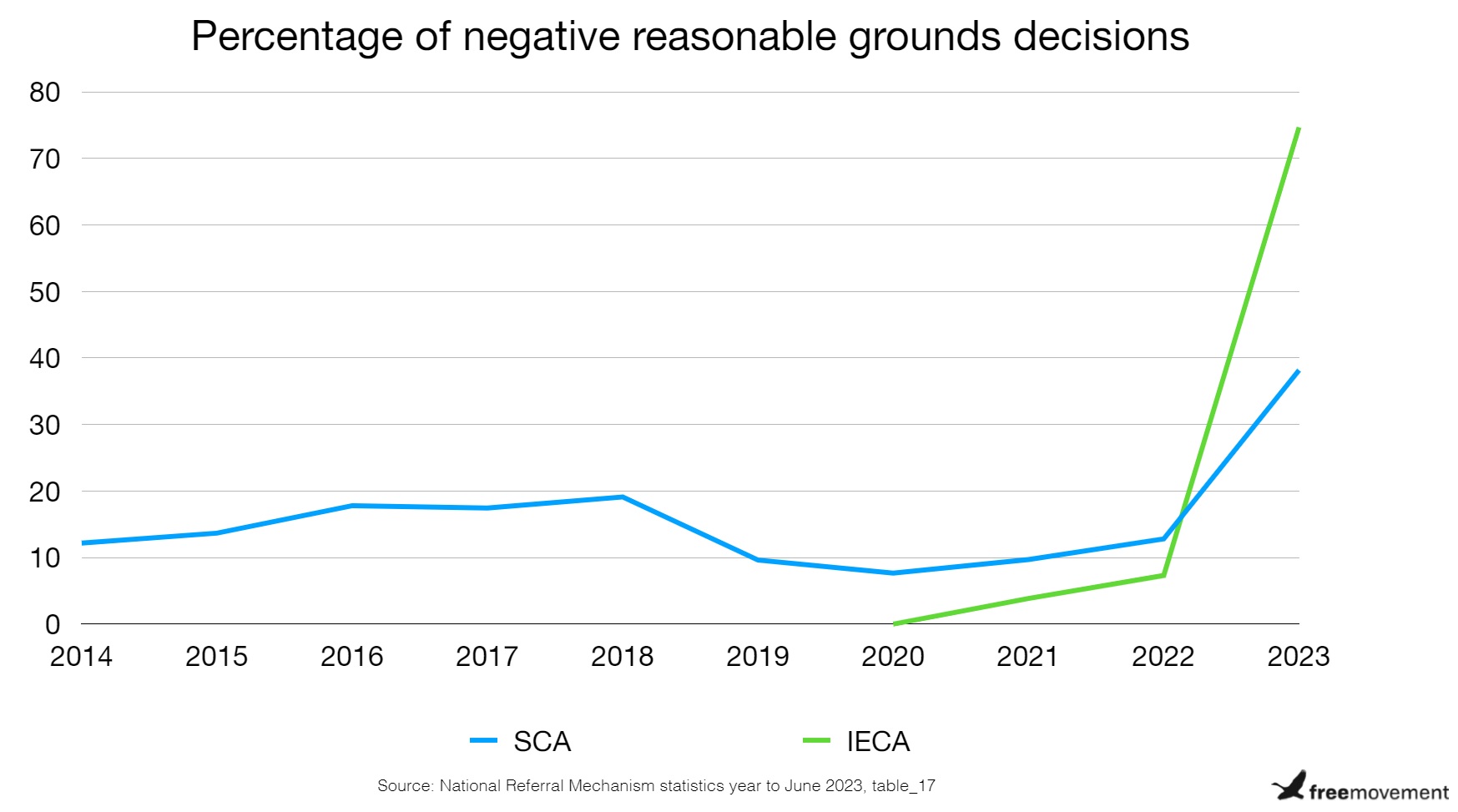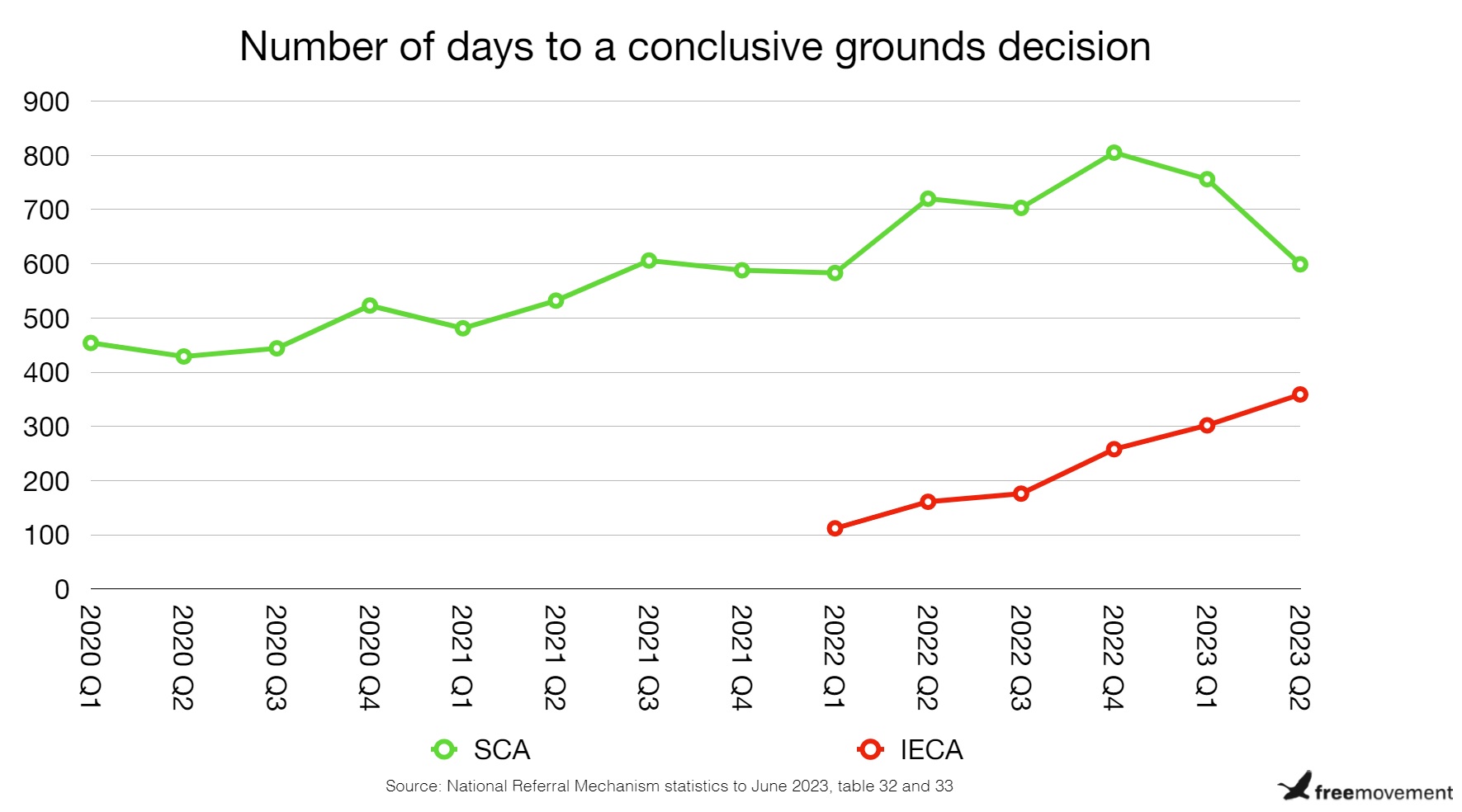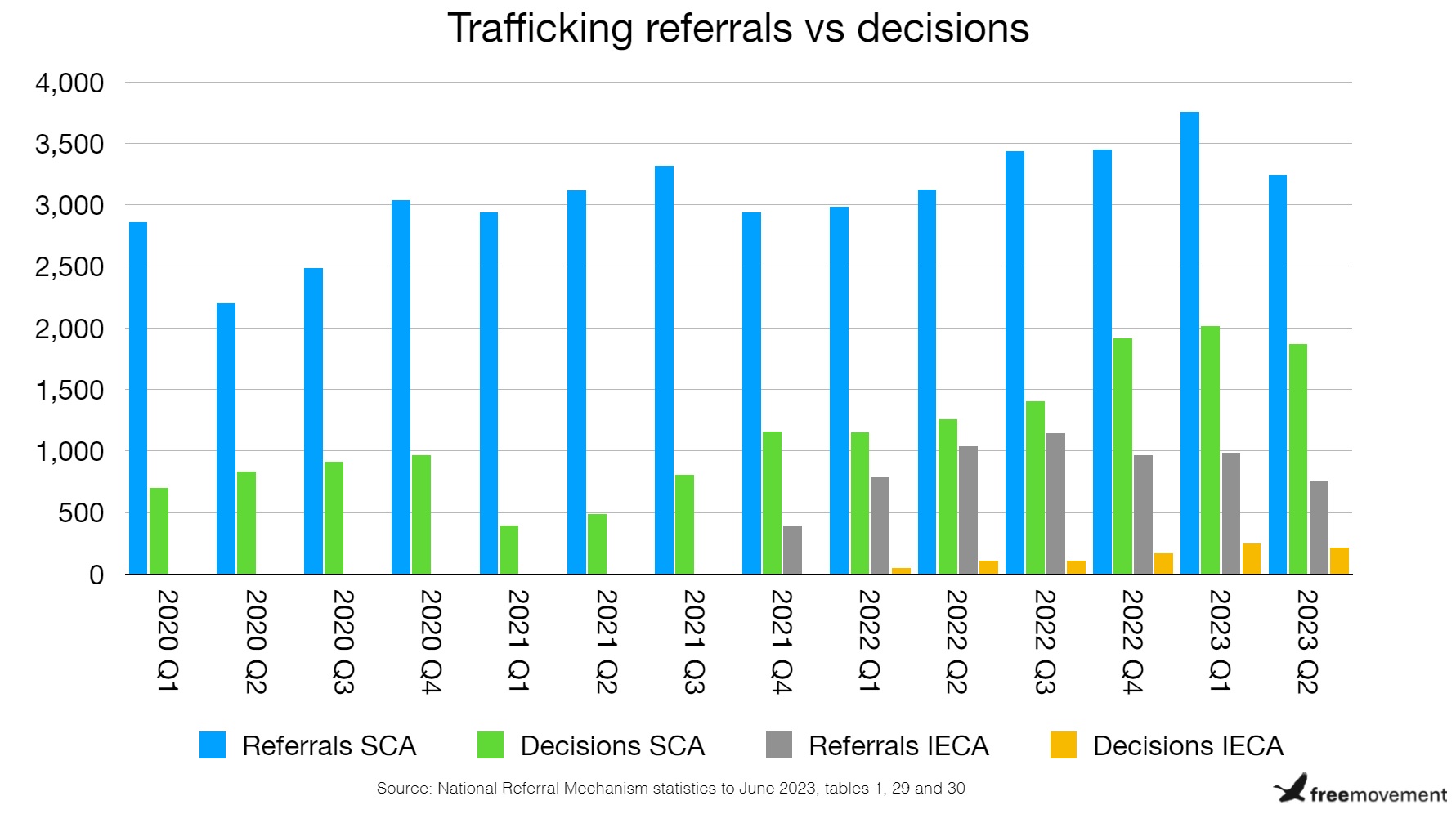- BY Sonia Lenegan

More delays, more refusals, no ‘bad faith’: the latest trafficking statistics
The latest trafficking statistics show a huge increase in both refusals and delays, suggesting the Nationality and Borders Act 2022 had had a disastrous impact on the protection of survivors of modern slavery.
Most of the trafficking provisions of the legislation came into effect on 30 January 2023. Changes were simultaneously made to the modern slavery statutory guidance and the immigration rules. The newly published data contains the first full quarter of statistics since then.
There are 36 tables in the raw data that was published, so I have specified below where the relevant data is located.
My previous article on trafficking statistics also has some useful context and explanations.
How does the modern slavery protection process work?
Firstly, a potential modern slavery survivor has to be referred by certain designated professionals into the protection system. Immigration lawyers cannot do this themselves. The protection system is called the ‘national referral mechanism’ (NRM).
Next, one of the two competent authorities must decide whether there are ‘reasonable grounds’ to think the referred person is a victim of modern slavery. The two bodies are the misnamed ‘single competent authority’ (SCA) and the ‘immigration enforcement competent authority’ (IECA). The latter was only created in 2021. As is indicated by the name, it has more of a focus on people without secure immigration status, including people who are detained or in the asylum inadmissibility process.
If the referred person receives a positive ‘reasonable grounds’ decision then they move to the next stage and will eventually receive a final decision from the competent authority handling their case on whether there are ‘conclusive grounds’ for thinking they are a victim of modern slavery.
Dramatic increase in reasonable grounds refusals post-Nationality and Borders Act 2022 (tables 16 to 18 and 28 to 30)
Refusals at the first stage of the national referral mechanism for survivors of modern slavery have increased significantly. Between April and June 2023 there were 1,348 negative reasonable grounds decisions for adults who had been referred to the national referral mechanism. That amounts to 75% of the total 1,809 decisions made.
This contrasts with the period October to December 2022, before the relevant sections of the Act were brought into force, when 2,322 decisions were made and only 16% of those were negative.

For children, negative reasonable grounds decisions have increased from 7% in April to June 2022 to 26% in the same period in 2023. The number of decisions made for children has not changed substantially.
The impact of the Nationality and Borders Act 2022 has been both significant and damaging to survivors of modern slavery who need support. It will be interesting to see the impact of recent litigation on the reasonable grounds statistics when the statistics are next published.
Negative conclusive grounds decisions made by the single competent authority have increased from 15% in October to December 2022 to 24% in April to June 2023. Children’s cases have seen slightly less of an increase, from 10% in October to December 2022 to 16%.
There has been a much larger increase in refusals at the final stage of the national referral mechanism process made by the immigration enforcement trafficking body. In October to December 2022 negative conclusive grounds decisions were at 45%, but in April to June 2023 this saw a large increase and 66% of cases were rejected.
For children, this has gone from 7% rejections to 68%. The numbers involved for children are much lower, but the change remains startling.
Delays (tables 19 to 21 and 31 to 33)
There have been huge increases in delays for reasonable grounds decisions with both the single competent authority and the immigration enforcement trafficking body. The average (mean) number of days has gone from 18 in January to March to 40 in April to June 2023 for the single competent authority. For the immigration enforcement trafficking body this has gone from 19 to 30 days. The statutory guidance states at 7.6 that, where possible, reasonable grounds decisions should be made within five working days of the referral.
For conclusive grounds decisions there has been a drop in delays in the single competent authority from 756 days in January to March to 599 days in April to June 2023. However the immigration enforcement trafficking body has seen a steady increase since reporting started at the beginning of 2022, and this is now up to 359 days for a conclusive grounds decision.

Backlog of decisions in the immigration enforcement trafficking body (tables 1 and 30)
The last time I wrote up these statistics, I calculated that the immigration enforcement trafficking body had made decisions on what amounted to 9% of the number of referrals it had received (1,147). Decisions would not necessarily relate to referrals made the same quarter due to delays, but this is useful to consider in relation to the growth of the backlog.

For April to June 2023, the immigration enforcement trafficking body received 756 referrals (table 1), and made 214 conclusive grounds decisions (table 30). The backlog has therefore increased by 542 cases. The single competent authority received 3,242 referrals and made 1,872 decisions, so the backlog there shows no sign of improving either, although proportionately it is doing much better than the immigration enforcement trafficking body.
Bad faith exclusions (tables 22 to 27)
Another of the changes made in January 2023 was the introduction of a ‘disqualification process’ under section 63 of the Act. There are two reasons a person can be disqualified from protection, the first being where they are deemed a threat to public order.
The second reason is where it is decided that they have claimed to be a victim of modern slavery ‘in bad faith’. This was included in the Act because of assertions of abuse of the system made by the government. There have been precisely zero ‘disqualification requests’ on bad faith grounds.
Duty to notify (table 35)
The duty to notify process is used where an adult is suspected to be a victim of modern slavery but does not consent to entering the national referral mechanism. In the whole of 2022 there were 4,580 such notifications and for the first half of 2023, there have been 2,568.
The top three nationalities where the duty to notify has been used are Eritrean (15% of the total), Albanian (14%), and Sudanese (11%). It is possible that Eritreans and Sudanese people are not entering the national referral mechanism after receiving legal advice and making an informed decision, as they are very likely to receive asylum and going via the national referral mechanism may lengthen the process for them. Given the government’s rhetoric around Albanians, it is not difficult to see why many of them would not want to engage with this process, despite this potentially assisting with an asylum claim.
Conclusion
The dust has not yet settled in relation to the impact of the Nationality and Borders Act 2022 on trafficking cases. All sorts of issues continue to be litigated. The next statistics release will potentially start to reflect recent changes and positive decisions may increase. The one thing that does seem certain is that the backlog of cases in the national referral mechanism, as is the case for asylum, will continue to grow.
Final note: if you are reading this, then you will probably also be interested in a new report from the Helen Bamber Foundation ‘Leave in Limbo: Survivors of trafficking with uncertain immigration status’. The report looks at the impact a lack of a secure immigration status has on survivors of trafficking.
SHARE


2 responses
If there have been precisely zero ‘disqualification requests’ on bad faith grounds, then are the Government’s assertions of abuse of the system acts of bad faith?